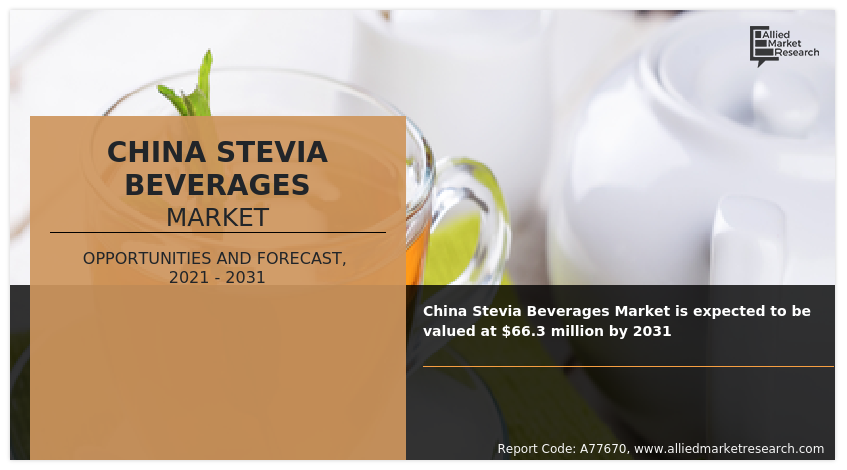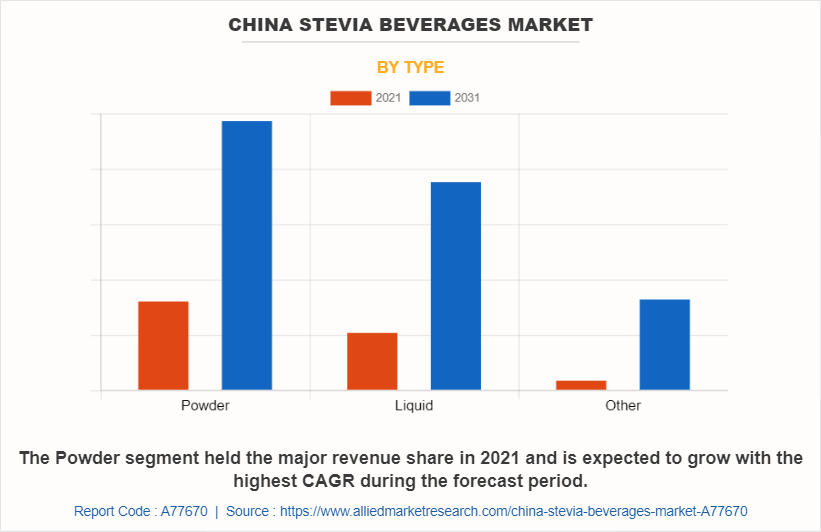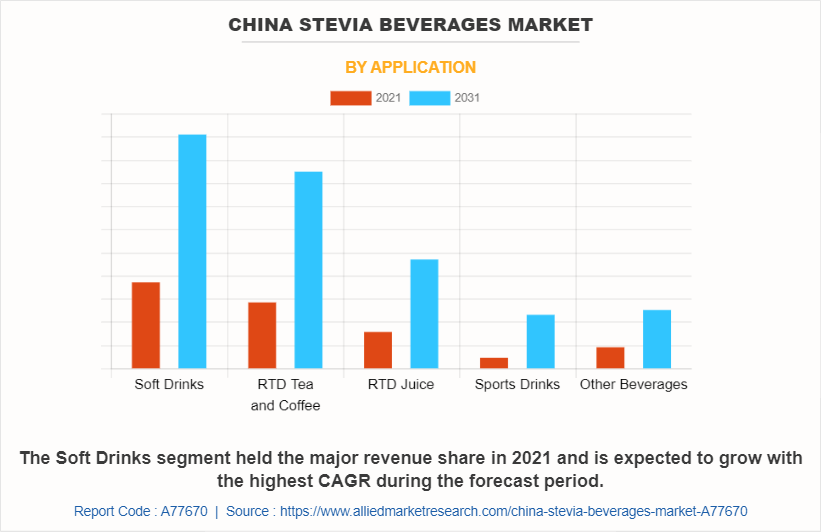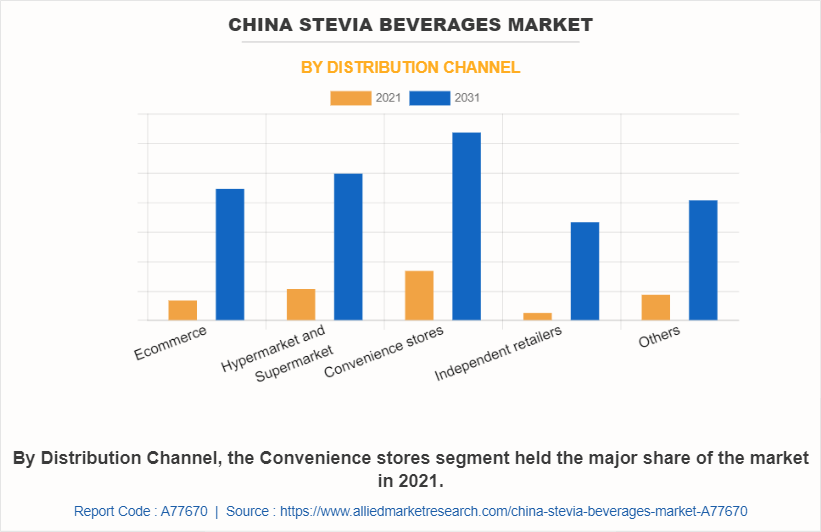The China stevia beverages market has been witnessing significant growth during the forecast period, owing to increase in health consciousness among Chinese consumers. Moreover, rise in popularity of low-calorie alternatives is driving the market growth. Furthermore, Stevia, a natural sweetener with no calories, caters to this demand. In addition, Stevia's appeal is bolstered by its potential health benefits, such as its ability to regulate blood sugar levels. In addition, the Chinese government's efforts for healthier food & beverage options are driving the market growth.

However, concerns regarding the taste of stevia are restraining the market growth. Although steviol glycosides are sweeter than sugar, they have a slightly bitter aftertaste. Moreover, high cost associated with stevia is a key factor restraining the growth of the China stevia beverages market.
On the contrary, rise in consumer awareness regarding the adverse effects of excess sugar consumption is expected to offer lucrative opportunities for market growth. Furthermore, manufacturers are exploring different formulations and flavors to enhance the appeal of stevia-sweetened beverages. In addition, companies are collaborating with health & fitness organizations to promote stevia beverages as part of a healthy lifestyle.

The China stevia beverages market is segmented into type, application, and distribution channel. On the basis of type, the market is categorized into powder, liquid, and other. As per application, it is classified into soft drinks, RTD tea & coffee, RTD juice, sports drinks, and other beverages. By distribution channel, it is fragmented into ecommerce, hypermarket & supermarket, convenience stores, independent retailers, and others.
Moreover, increase in adoption of e-commerce and online shopping is a key trend driving the market growth. Furthermore, consumers are increasingly seeking healthier sugar alternatives, such as stevia-sweetened energy drinks, flavored water, and other functional beverages. In addition, companies are investing in new product development and R&D to overcome the taste challenges associated with stevia. Moreover, companies are actively conducting consumer surveys and market research to gauge preferences and identify trends. Feedback from consumers plays a vital role in product development and marketing strategies.

Furthermore, as stevia-sweetened beverages are perceived as premium products due to the higher cost of production, competitive pricing strategies make them accessible to a wider range of consumers. In addition, discounts, bundled offerings, and promotional campaigns are being utilized to attract price-sensitive customers.
The Porter's five forces analysis assesses the competitive strength of the players in the China stevia beverages market. These five forces include the bargaining power of suppliers, the bargaining power of buyers, the threat of new entrants, the threat of substitutes, and competitive rivalry. The bargaining power of suppliers is moderate, as surge in demand for stevia has led to rise in number of suppliers entering the market. The bargaining power of buyers is high, as there are various options available in the market. The threat of new entrants is low, as the need for significant capital investment, R&D capabilities, and regulatory approvals deter new players from entering the industry. The threat of substitutes is moderate, as traditional sugar remains a substitute, while increase in awareness regarding the health risks associated with sugar consumption makes stevia an attractive alternative. The competitive rivalry is high, as several market players compete for the market share.

A SWOT analysis of the China stevia beverages market includes strengths, weaknesses, opportunities, and threats. The strengths include natural and low-calorie sweeteners, government support for healthier food & beverage options, and increase in health-consciousness among consumers. The weaknesses include taste perception, higher production costs compared to traditional sugar, and perception of premium pricing. The opportunities include innovation in product development, expansion into new beverage categories, and partnerships with health & fitness organizations. The threats include competition from other low-calorie sweeteners, taste challenges & consumer preferences, and fluctuations in the supply & cost of stevia extract.
The key players operating in the China stevia beverages market include Coca-Cola, PepsiCo, Nestlé, Danone, China Mengniu Dairy Company, Wahaha, Uni-President, JDB Group, Vitasoy International Holdings, and Hangzhou Wahaha Group.
Key Benefits For Stakeholders
- Enable informed decision-making process and offer market analysis based on current market situation and estimated future trends.
- Analyze the key strategies adopted by major market players in china stevia beverages market.
- Assess and rank the top factors that are expected to affect the growth of china stevia beverages market.
- Top Player positioning provides a clear understanding of the present position of market players.
- Detailed analysis of the china stevia beverages market segmentation assists to determine the prevailing market opportunities.
- Identify key investment pockets for various offerings in the market.
China Stevia Beverages Market Report Highlights
| Aspects | Details |
| Forecast period | 2021 - 2031 |
| Report Pages | 75 |
| By Type |
|
| By Application |
|
| By Distribution Channel |
|
| Key Market Players | Baiyun Mountain Health Industry Holding Co. Ltd., Kweichow Moutai Co. Ltd., Hangzhou-based Joylay Natural Beverage Co. Ltd., Bright Food (Group) Company Ltd., Beijing C&W Spice and Tea Co. Ltd., Hangzhou Wahaha Group Co. Ltd., NongShim Holding Co. Ltd., Nestlé (China) Ltd., Budweiser Brewing Company APAC Ltd., Shanghai Babylon Limited |
The China Stevia Beverages Market is estimated to reach $66.3 million by 2031
NongShim Holding Co. Ltd., Shanghai Babylon Limited, Beijing C&W Spice and Tea Co. Ltd., Bright Food (Group) Company Ltd., Kweichow Moutai Co. Ltd., Hangzhou Wahaha Group Co. Ltd., Nestlé (China) Ltd., Budweiser Brewing Company APAC Ltd., Hangzhou-based Joylay Natural Beverage Co. Ltd., Baiyun Mountain Health Industry Holding Co. Ltd. are the leading players in China Stevia Beverages Market
1. Enable informed decision-making process and offer market analysis based on current market situation and estimated future trends.
2. Analyze the key strategies adopted by major market players in china stevia beverages market.
3. Assess and rank the top factors that are expected to affect the growth of china stevia beverages market.
4. Top Player positioning provides a clear understanding of the present position of market players.
5. Detailed analysis of the china stevia beverages market segmentation assists to determine the prevailing market opportunities.
6. Identify key investment pockets for various offerings in the market.
China Stevia Beverages Market is classified as by type, by application, by distribution channel
Loading Table Of Content...
Loading Research Methodology...



